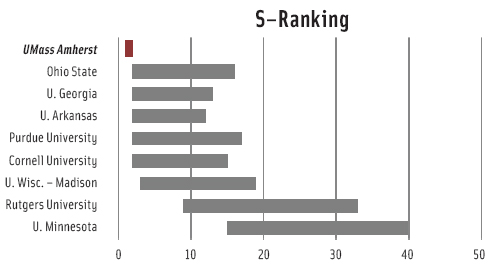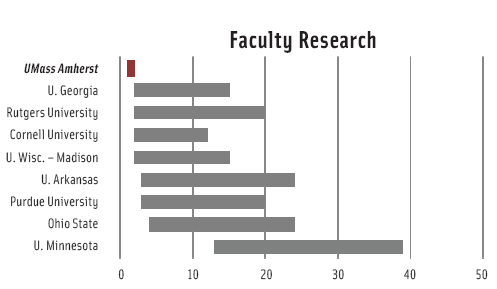UMass Food Science Ph.D. Program Sets the Bar
PERSPECTIVE
Did you know that the National Research Council (NRC) recently compared all Ph.D. programs across the United States and found that the University of Massachusetts Food Science program was one of the best—in any discipline? Wow! But what does that mean to me, a graduate of the University of California, Davis’s Food Science program or my husband, who graduated from Cornell Food Science? Are we angry that our “home team” wasn’t given that recognition or should this be a cause of celebration and forward focus? I think the latter.
When I heard about the recognition for UMass’s program, I first thought of people I associate with the department—Jack Francis, Fergus Clydesdale, Spencer Sullivan, Ken Lee, Noel Anderson, and Aurora Saulo to name a few from the long list. These are people who engage in their work and in our field. They have for their entire professional careers. So, is this the result of who they are or where they got trained? Probably both, but let’s explore a bit about UMass’s ranking and why the NRC rankings program is relevant to all of us.
As defined by the NRC project, the quality of doctoral programs is a multidimensional concept and assessing that quality requires highlighting some of the more significant factors underlying it. The critical dimensions that NRC found relevant were: 1) the research activity of program faculty; 2) student support and outcomes; 3) diversity of the academic environment; and 4) two summary measures that provide ranges of rankings of the estimated overall quality of programs which included the above three dimensions with appropriate analysis to provide a quantitative assessment (this makes for five relevant ranking categories).
What is exciting and amazing is that UMass Food Science received the sole number one ranking in two of five dimensions. Those of us who know a little about statistics and analysis understand that a finding like this is rarely by chance but rather more purpose driven. From two of the tables from the research article (see tables at end of this article), you can see that both the quantitative analysis and the important measure of research activity demonstrate the superiority of UMass. In the vernacular, UMass kicked butt against the rest of our food science graduate programs.
Why does this matter? We now have a true benchmark program to measure other Food Science programs and goals against. As in art, UMass can stand as our Mona Lisa. Yes, there are many other paintings in the world. But discussions always come back to that smallest painting in the Louvre Museum and the slight smile of the woman painted by the man from Verona.
What is it about this doctoral program on the East Coast where some of the people don’t talk like us and they like the cold weather and being close to places where “Nor’easters” occur? Those of us who have food science running through our veins and want education programs in our field to be vital need to embrace this independent acknowledgment of the UMass ranking and ask how do we support their program and how do we all become more like them?
Why does academic research activity matter? How do we support that? Support and outcomes of students is highly relevant. If we only research what is interesting rather than what is relevant and interesting, the outcomes of the graduates will not lead to the successes we wished for them. Putting aside personal or academic competition, it would be wise for us to truly study how UMass puts its program together, what it is like to be a doctoral student in its program, and why an outside group can compare that program across many disciplines and come out with these results.
I would like to see a half-day session at the next IFT Annual Meeting organized to help us all understand these results and how we apply them to both academic and corporate programs. Knowing how high up might be allows us to reframe how we look at ourselves, our programs and businesses, and our metrics.
Benchmarks and metrics help us make sense of multiple moving elements in a complex world. The world of education and doctoral programs—with their lack of immediacy and demonstrated “next quarter results”—poses large issues for us as a community and as a group of individuals interested in science that matters to humans. It is wonderful to be able to celebrate a member of our community and the distinction this ranking has created for the field of food science.
Jacqueline Beckley , a Professional Member of IFT and IFT Fellow, is President and Chief Innovator for The Understanding & Insight Group LLC, 3 Rosewood Lane, Suite 103, Denville, NJ 07834 ( [email protected] ).


Tables Source: http://en.wikipedia.org/wiki/United_States_National_Research_Council_rankings and the pdf of A Revised Guide to the Methodology of the Data-Based Assessment of Research-Doctorate Programs in the United States (2010) http://www.nap.edu/catalog/12974.html
